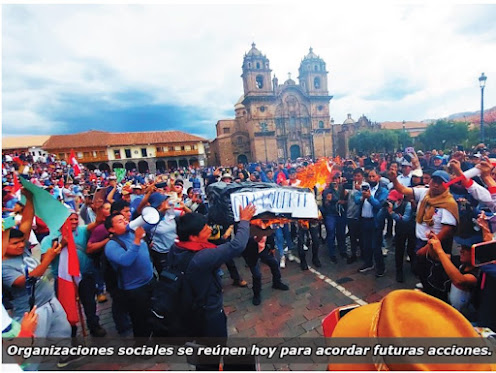Peru’s Failed Presidential Coup Sparks Democratic Crisis (Foreign Policy - 12/20/2022)
Peru’s Failed Presidential Coup Sparks Democratic Crisis (full article)
Protesters see the president’s dismissal as a power grab by an unpopular Congress.
Nick Aspinwall, Alicia Chen
Supporters of former President Pedro Castillo hold a blockade on a highway at the entrance of Abancay, Peru, on Dec. 19.
CUSCO, Peru—Pedro Castillo’s ouster as Peru’s president on Dec. 7 initially appeared to be just another act in the long-running political drama that has seen six Peruvian presidents take the stage in less than five years. The left-wing leader, whose approval rating had been around 20 percent, had brazenly, and illegally, tried to dissolve Peru’s Congress to stave off a third attempt at impeaching him after surviving the first two, drawing widespread condemnation for undermining the constitution. Hours later, the legislature impeached him anyway, and he was arrested for “breaching constitutional order.”
Yet in the aftermath of Castillo’s attempted self-coup, Peruvians have reacted with fury over new government measures many consider to be the most severe threat to democracy since the 1990s. After days of initial calm, protests swelled last week throughout the country, particularly in the Andes regions, as Peruvians of all political backgrounds reacted with fury to what they see as a power grab by a self-serving and corrupt Congress, whose popularity hovers around just 11 percent. Protesters crafted makeshift roadblocks of burning tires and wood logs and closed airports in Peru’s second largest city, Arequipa, and its tourist hub Cusco, snarling vital transportation links for days and stranding hundreds of foreign nationals visiting the famed Machu Picchu ruins.
Many Peruvians also want a citizen’s assembly to draft a new constitution, replacing the 1993 document implemented after notoriously corrupt then-President Alberto Fujimori himself dissolved Congress to remove parliamentary rivals in a self-coup one year earlier. That constitution allows the legislature to impeach presidents by a two-thirds vote without cause, effectively giving it the power to undercut the executive. Because of constitutional quirks that align legislative elections with the first round of presidential elections, rather than the runoff, Peruvian presidents never take power with a legislative majority, making it inevitable that the two branches will be at odds—just as Castillo’s agenda was hamstrung by constant bickering with right-wing legislators during his 17-month tenure. (more)
Tags: #Peru #PedroCastillo #Protests #Constitution




Comments
Post a Comment